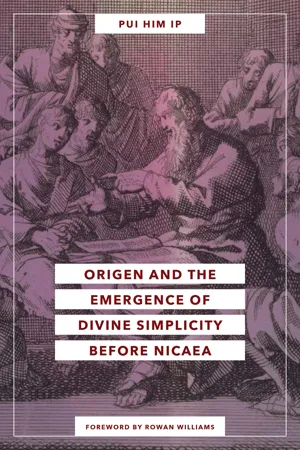
- English
- ePUB (mobile friendly)
- Available on iOS & Android
Origen and the Emergence of Divine Simplicity before Nicaea
About This Book
This book establishes how the doctrine of divine simplicity was interwoven with the formation of a Christian Trinitarian understanding of God before Nicaea.
For centuries, Christian theology affirmed God as simple ( haplous ) and Triune. But the doctrine of the simple Trinity has been challenged by modern critics of classical theism. How can God, conceived as purely one without multiplicity, be a Trinity? This book sets a new historical foundation for addressing this question by tracing how divine simplicity emerged as a key notion in early Christianity. Pui Him Ip argues that only in light of the Platonic synthesis between the Good and the First Principle ( arch? ) can we make sense of divine simplicity as a refusal to associate any kind of plurality that brings about contraries in the divine life. This philosophical doctrine, according to Ip, was integral to how early Christians began to speak of the divine life in terms of a relationship between Father and Son.
Through detailed historical exploration of Irenaeus, sources from the Monarchian controversy, and especially Origen's oeuvre, Ip contends that the key contribution from ante-Nicene theology is the realization that it is nontrivial to speak of the begetting of a distinct person (Son) from a simple source (Father). This question became the central problematic in Trinitarian theology before Nicaea and remained crucial for understanding the emergence of rival accounts of the Trinity ("pro-Nicene" and "anti-Nicene" theologies) in the fourth century. Origen and the Emergence of Divine Simplicity before Nicaea suggests a new revisional historiography of theological developments after Origen and will be necessary reading for serious students both of patristics and of the wider history of Christian thought.
Frequently asked questions
Information
Table of contents
- Title
- Copyright
- Dedication
- Contents
- Foreword by Rowan Williams
- Acknowledgements
- Note to the Reader
- Abbreviations
- Introduction. In Search of Doctrinal History
- Chapter 1 The Locus Classicus of Divine Simplicity
- Chapter 2 From the Simple God to the Simple First Principle
- Chapter 3 Irenaeus’s Critique of Valentinian Emission and the Proto-Trinitarian Problematic
- Chapter 4 Monarchianism and the Fully Trinitarian Problematic
- Chapter 5 Divine Simplicity as a Metaphysical-Ethical Synthesis in Origen
- Chapter 6 Divine Simplicity as an Anti-Monarchian Principle of Differentiation between the Father and the Son
- Chapter 7 Divine Simplicity as an Anti-Valentinian Principle of Unity between the Father and the Son
- Epilogue. Toward a Prospective Historiography
- Notes
- Bibliography
- Scripture Index
- General Index